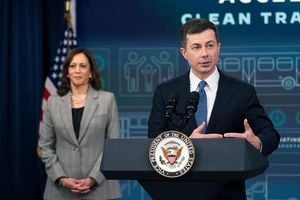Michigan’s political landscape is heating up with more than a year to go before the 2026 midterm elections, as lawmakers, candidates, and activists clash over issues ranging from health care and protest rights to party loyalty. The state, long a bellwether for national trends, is once again at the crossroads of pivotal debates that could shape not only its own future but also the direction of the country.
At the center of the action is former Republican Congressman Mike Rogers, who narrowly lost his Senate bid in 2024 by just 19,000 votes—even as Donald Trump carried Michigan. Refusing to fade from the spotlight, Rogers announced a fresh run for the Senate in April 2025. This time, he’s got the wind at his back: GOP Senate leaders quickly rallied behind him, and Trump himself offered an enthusiastic endorsement, according to POLITICO. With the party establishment clearing the field, Rogers is betting that his alignment with Trump’s policies—especially the much-discussed ‘One Big Beautiful Bill’ (OBBB)—will resonate with voters, even though the former president won’t be on the ballot to boost turnout.
“Donald Trump’s policies will be on the ballot, for sure,” Rogers told POLITICO, highlighting new tax breaks, such as no taxes on tips and overtime, as key wins for working Michiganders. He’s confident that if 85% of those who supported him in 2024 return to the polls, he’ll clinch victory in 2026. “That is a very different race than going out trying to figure out how you get people to vote for you for the first time,” he said.
Rogers’ optimism is rooted in a familiar playbook: let Democrats fight among themselves while he focuses on turnout. The Democratic field, meanwhile, is anything but settled. Three major candidates—Rep. Haley Stevens, state Sen. Mallory McMorrow, and physician Abdul El-Sayed—are locked in a messy primary that won’t conclude until August 2026. Each brings a different strategy to the table, but all see Rogers’ embrace of Trump’s agenda as both a vulnerability and an opportunity.
“People are at a breaking point,” Stevens said after a recent roundtable focused on manufacturing, as reported by POLITICO. “I’m certainly very eager to explain my differences with the administration and Mike Rogers on this legislation. But more so, it is that the average American, our Michiganders, are being pushed to the brink on rising costs.”
McMorrow, for her part, argues that Democrats can’t just tie Rogers to Trump and hope for the best. “There’s an opening to say to people, you have every right to be angry. And that’s different from what we heard in 2024,” she told POLITICO. “It’s not just about fighting Donald Trump to restore the way that things were, but it’s recognizing he actually hasn’t delivered on bringing your costs down—quite the opposite.”
El-Sayed, endorsed by Bernie Sanders, isn’t mincing words. “Mike Rogers is a weak-ass tool,” he said. “The man has zero political talent, he’s like a non-playing character in life. When you have to go to Mar-a-Lago because you’re a neighbor in Florida, and ask another man for his blessing to run for office and ask other people to clear the field for you, all that tells me is you’re a beta character.”
Yet the policy at the heart of the 2026 campaign—the OBBB—remains a double-edged sword. While Rogers touts its tax relief provisions, Democrats are zeroing in on its Medicaid cuts, which have become a rallying cry at town halls across the state. As reported by NPR, Brian Peters, CEO of the Michigan Health and Hospital Association, warned that as many as 700,000 Michiganders could lose Medicaid coverage due to new work requirements and paperwork burdens. “A lot of people may fall off the rolls not because they are ineligible, but because of paperwork burdens,” Peters explained. With nearly 2.7 million Michiganders relying on Medicaid, the stakes are high.
At a recent Democratic event in Macomb County, the OBBB drew boos from the crowd. Senator Mark Kelly (D-Ariz.), headlining the event, criticized Republicans for supporting Medicaid cuts, saying, “A lot of my Republican colleagues had an opportunity to suck it up and do the right thing … but ultimately, you saw what happened. You know, they tend to fall in line.”
Republicans, for their part, insist the law targets only “waste, fraud and abuse.” But Peters counters, “When you look at the Medicaid population here in the state of Michigan, we know that almost all of those folks are working and working full time.” Political scientist Corwin Smidt of Michigan State University noted that 82% of residents oppose cutting Medicaid to pay for tax cuts, making it a potentially explosive issue for the GOP—especially since many of the changes won’t take effect until after the midterms.
Meanwhile, Michigan’s political battles aren’t confined to campaign rhetoric. On August 20, 2025, the state House Judiciary Committee considered House Bill 4664, which would make blocking public roads during protests a misdemeanor, punishable by up to 93 days in jail and a $5,000 fine. The bill, sponsored by Rep. Alicia St. Germaine (R-Harrison Township), aims to prevent traffic obstructions during political demonstrations, citing public safety concerns. Macomb County Prosecutor Peter Lucido and Oakland County Sheriff Mike Bouchard testified in favor, warning that blocked roads can have “life and death ramifications for first responders.”
But the American Civil Liberties Union of Michigan is pushing back, with legislative director Kyle Zawacki arguing that the bill threatens free speech and peaceful assembly rights. “Demonstrations on public streets have long been utilized for political speech, marches, rallies. Protests all require a physical space to occupy in order to exist,” Zawacki said, referencing the U.S. Supreme Court’s 1939 Hague v. Committee for Industrial Organization decision upholding protest rights in public spaces.
The debate quickly turned to constitutional rights, with Rep. Jay DeBoyer (R-Clay) insisting, “I know that we’re not talking about lawful protest, we’re talking about unlawful protest. … There is a significant difference.” Zawacki responded by clarifying that the ACLU’s main concern is the escalation of penalties, not the venue of protest itself.
Amid these battles, the Michigan Democratic Party is also tightening its grip on internal loyalty. On August 21, 2025, party chairman Curtis Hertel Jr. confirmed that Democrats endorsing Detroit Mayor Mike Duggan’s independent gubernatorial campaign would lose access to the party’s main voter data program, according to The Detroit News. The move marks an escalation in the party’s effort to block Duggan—a former Democrat and current mayor of Michigan’s largest city—from siphoning votes away from the party’s official nominee in 2026.
With Medicaid cuts, protest rights, and party discipline all in play, Michigan’s political scene is brimming with tension, high stakes, and no shortage of drama. Whether these battles will energize voters or leave them feeling more divided remains to be seen, but one thing’s for sure: the road to 2026 in Michigan promises to be anything but dull.




